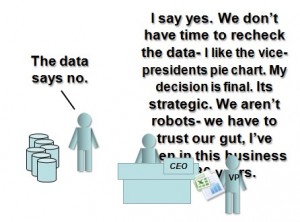« Data migration Part 5- Breaking down the information silos | Spreadsheet errors- Fear, uncertainty and doubt »
The tragedy of anti-data leadership and dataphobia
There has been a lot of discussion in the last year or so about how important data analysis is becoming.
IBM made a major move into data analytics by establishing a new organisation “Business Analytics & Optimization Services” with 4000 people in it.
There was the much quoted Hal Varian of Google who predicted that the sexy new job this century will be some sort of data analyst/statistician.
But I believe there is a powerful force in many businesses that will slow down our headlong rush towards a fact based, analytical thinking, data quality focused future.
As a group they are generally referred to as “Upper management” or “Leadership”.
Now to be fair, there are obviously great leaders and executives that understand that data is important.
But the fact that making decisions based on facts and data is actually defined as school of thought- “Fact based management” or “Evidence based management”, or in the medical area its called “evidence based medicine” illustrates that too many alternatives still exist.
The lies and dirty tricks of anti-data leadership
They make comments that equate analysis with “delay”.
They confuse considering options with “indecisiveness”.
They don’t invite people who actually have seen or understand the data to their meetings.
They come up with all sorts of alternate ways to make decisions- and defend their position even when the data clearly does not support them:
Call it strategic
I know the numbers don’t add up right now, but this is strategic.
What does that mean- our strategy is to do things without ROI?
Go with consensus perception
We don’t have time to get the actual data- we’re going to have to make a decision based on what the people on the ground are seeing.
If you ignore data, create a hypothesis and then go looking for supporting “evidence” in the form of people “on the ground” thinking it’s a good idea, you’ll find it.
People take suggestions from your questions and generate a matching memory/perception of what they think is happening in the real world. This is something that is well understood and the accuracy of eye witness testimony is known to be poor.
Blame the data quality
You know we have issues with that data. I don’t think we can risk relying on it.
So what’s the alternative? Tea leaves? Might be some risk in that too.
And why is the data quality an issue? Probably because leadership didn’t approve the budget and support the process changes that would have improved it. If the top executives aren’t responsible for data quality in their organisation and have decided not to use the data then a company is in a sad, dysfunctional state.
Moving forward- fight the anti-data forces of evil
Now, no-one can analyse forever- eventually a decision needs to be made.
Often, not all the analysis we want to do can be done. The number one reason anti-data leadership will likely reject doing detailed analysis is that it takes too long. They want to “pull the trigger” and get going, even if the decision is clueless (literally).
Always be working on fixing the structural issues that slow analysis down
These kinds of issues can slow you down:
- If you have bad quality data in your systems, any analysis must first fix it- causing delays.
- If you don’t have the people on staff to do the analysis, you have to hire consultants, adding delay and cost.
- If your data definitions are inconsistent across the company and with industry standards, mixing data from between operating units and other data sources takes forever.
Create a culture of data
Some examples of beliefs that need to be openly stated and shared:
- the best way to make decisions, if possible, is by looking at actual data.
- firing off decisions made on the basis of hunches isn’t being “aggressive and decisive”. It’s sloppy and incompetent.
- data management and analysis is a key competency for ALL employees in ALL departments not just information technology.
Create data analysis SWAT teams
On top of this, there are new techniques needed to enable data analysis to be fast enough to make decisions timely. It is just not possible to launch a waterfall project, to try to find a date three weeks from now when everyone can get together for a functional requirements meeting.
Companies need to create teams (perhaps virtual, coming together when needed) that are able to use fast, flexible tools to do analysis quickly. I am hoping that the Datamartist tool is one of the new tools that such SWAT teams would have in their toolkit.
The bottom line is that companies who have leaders that “get” data are going to be running circles around companies with executive dinosaurs who’s eyes glaze over if anyone starts actually talking about facts and figures that can’t fit on a single three dimensional pie chart in power point.
The future is data, but can we overcome the anti-data forces and their dataphobia?
« Data migration Part 5- Breaking down the information silos | Spreadsheet errors- Fear, uncertainty and doubt »


I am really pleased to glance at this blog posts which contains tons of helpful facts, thanks
for providing these statistics.